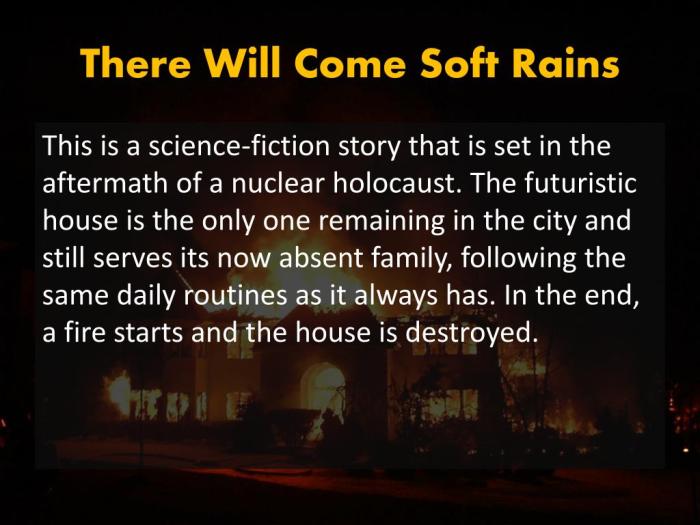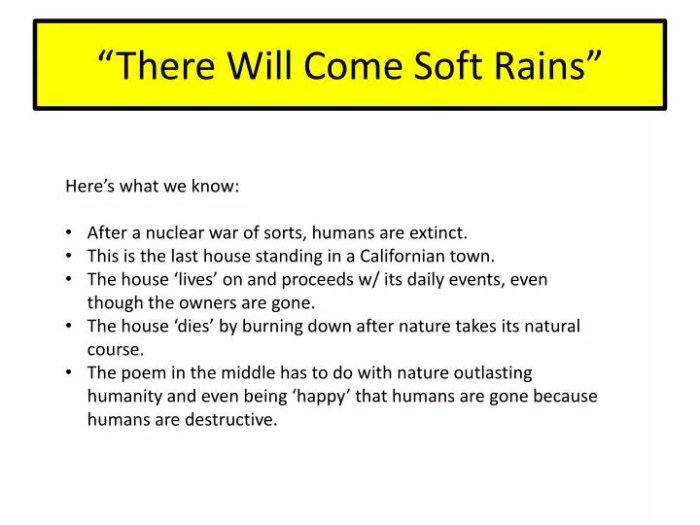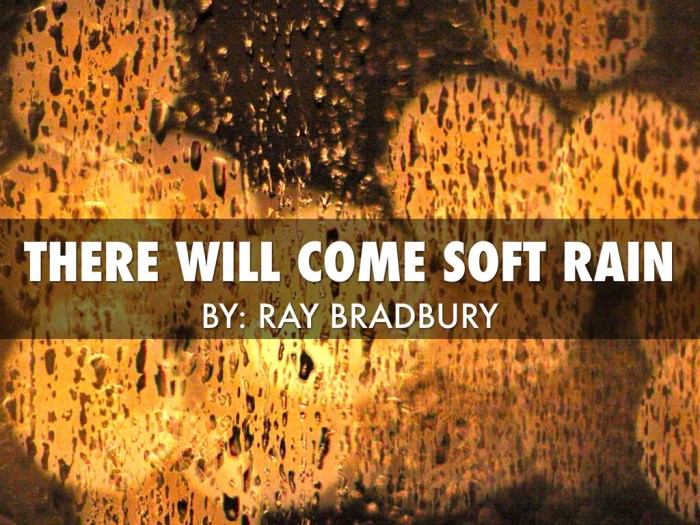There will come soft rains mood – In Ray Bradbury’s evocative short story “There Will Come Soft Rains,” the title serves as a haunting leitmotif, foreshadowing the desolate yet serene atmosphere that pervades this tale of a world without humans. This story delves into profound themes of loss, the power of technology, and the consequences of human absence.
Bradbury’s vivid prose paints a chilling portrait of an automated house, its systems diligently performing daily routines long after its occupants have vanished. The absence of human presence creates an eerie sense of displacement, raising questions about the nature of humanity and our dependence on technology.
The Mood of Soft Rains

The story “There Will Come Soft Rains” by Ray Bradbury creates a distinct mood of foreboding and isolation through its setting, imagery, and use of foreshadowing and symbolism.
Setting and Imagery
The story takes place in a deserted house, the only signs of life being the automated systems that continue to function even after the inhabitants have perished. The house is described in meticulous detail, with Bradbury using vivid imagery to create a sense of emptiness and decay.
The abandoned toys, the ticking clocks, and the overgrown garden all contribute to a feeling of abandonment and loss.
Foreshadowing and Symbolism
Bradbury uses foreshadowing throughout the story to hint at the impending disaster that has wiped out humanity. The ticking clocks and the repeated refrain of “There will come soft rains” create a sense of urgency and inevitability. The symbols of the house, the garden, and the rain also contribute to the mood of the story.
The house represents the remnants of human civilization, while the garden symbolizes the natural world that will continue to exist even after humans are gone. The rain, which is both life-giving and destructive, symbolizes the cycle of life and death.
The House and Its Inhabitants

In Bradbury’s “There Will Come Soft Rains,” the house serves as a primary character, embodying the theme of technological advancement and its implications for humanity. The house is equipped with advanced technology and automated systems that simulate human presence and perform various tasks.
Advanced Technology and Automated Systems
- Self-Operating Appliances:The house features self-operating appliances such as the stove, refrigerator, and vacuum cleaner, which function independently without human intervention.
- Artificial Intelligence:The house possesses a central control system that manages its functions and interacts with its occupants through a voice-activated interface.
- Environmental Controls:The house maintains optimal temperature, humidity, and lighting levels, creating a comfortable and hospitable environment for its inhabitants.
The House as a Character
The house functions as a character in the story, representing the absence of human presence while ironically simulating human-like behavior. The automated systems perform tasks that would typically be carried out by humans, creating an illusion of life within the empty house.
Contrast between Human-Like Behavior and Absence of Occupants
The house’s advanced technology and automated systems mimic human behavior, yet the absence of actual human occupants creates a stark contrast. The house’s actions become eerily mechanical and soulless, highlighting the limitations of technology in replacing human connection and interaction.
The Natural World

The natural world outside the house in “There Will Come Soft Rains” is described in vivid and haunting imagery. The reader is presented with a world that is both beautiful and terrifying, a place where the natural order has been disrupted by the destructive force of nuclear war.
The house itself is a symbol of the artificial world that humans have created. It is a place of order and beauty, a refuge from the chaos of the outside world. However, the natural world is constantly encroaching on the house, reminding the reader of the fragility of human civilization.
The Interaction of the Natural World and the Automated Systems
The automated systems in the house are constantly interacting with the natural world. The sprinklers water the lawn, the thermostat controls the temperature, and the lights turn on and off automatically. These systems are designed to create a comfortable and safe environment for the inhabitants of the house.
However, the natural world is not always cooperative. The rain can flood the lawn, the wind can break the windows, and the sun can overheat the house. These events can disrupt the automated systems and make the house less comfortable and safe.
The Irony of the House’s Ability to Maintain Order and Beauty
The house’s ability to maintain order and beauty in the face of the outside world’s chaos is ironic. The house is a symbol of human civilization, and its ability to function in the face of such destruction is a testament to the resilience of the human spirit.
However, the house is also a reminder of the fragility of human civilization. The house is only able to function because of the automated systems that keep it running. If these systems were to fail, the house would quickly fall into disrepair.
The house in “There Will Come Soft Rains” is a symbol of the human condition. It is a place of beauty and order, but it is also a place of fragility. The house is a reminder that even the most advanced human civilizations are vulnerable to the forces of nature.
The Absence of Humans: There Will Come Soft Rains Mood
The absence of humans in “There Will Come Soft Rains” is a significant aspect of the story that contributes to its haunting and thought-provoking nature. The lack of human presence emphasizes the dominance of technology and the fragility of humanity in the face of its own creations.
The story explores the implications of a world without humans, raising questions about the purpose of technology and the consequences of unchecked scientific advancement. Without humans to interact with and benefit from the automated systems, the house and its surroundings become a surreal and eerie environment, highlighting the emptiness and futility of a world devoid of life.
Ethical Questions
The story raises ethical questions about the potential impact of technology on humanity. It prompts us to consider the responsibilities that come with technological advancements and the need to ensure that technology serves human needs and values rather than becoming a threat to our existence.
- What are the ethical implications of creating artificial intelligence that may surpass human capabilities?
- How can we ensure that technology is used for the benefit of humanity and not to its detriment?
- What responsibilities do scientists and engineers have in shaping the future of technology and its impact on society?
The Power of Technology

Ray Bradbury’s “There Will Come Soft Rains” depicts a technologically advanced house that operates autonomously, despite the absence of human inhabitants. This advanced technology has a profound impact on the house and its environment, enabling certain functions while also limiting others.
Technological Advancements and Their Impact
- Automated Systems:The house is equipped with automated systems that perform daily tasks such as cleaning, cooking, and maintaining the environment. These systems ensure that the house remains habitable and comfortable, even in the absence of humans.
- Environmental Control:The house has advanced environmental control systems that regulate temperature, humidity, and air quality. This creates an optimal living environment, ensuring the preservation of the house and its contents.
- Entertainment and Communication:The house features a variety of entertainment and communication devices, including a television, radio, and telephone. These devices provide a semblance of companionship and connection to the outside world, even though the house is unoccupied.
Enabling and Limiting Effects of Technology
- Convenience and Efficiency:The advanced technology in the house provides convenience and efficiency, allowing it to function autonomously without human intervention. This frees up time and resources that would otherwise be spent on manual tasks.
- Limited Human Interaction:While the technology enables the house to operate smoothly, it also limits human interaction. The absence of human inhabitants creates a sense of isolation and loneliness, as the house is designed to serve the needs of people who are no longer there.
- Potential for Misuse:The reliance on advanced technology also raises concerns about potential misuse. In the wrong hands, such technology could be used for surveillance, control, or even malicious purposes.
The Theme of Loss
In “There Will Come Soft Rains,” Bradbury explores the profound themes of loss and grief through various perspectives and experiences.
The Loss of Human Life
The most prominent loss in the story is the absence of humans. The house’s automated systems continue to function diligently, oblivious to the fact that its occupants have perished in a nuclear war. The absence of human presence creates a haunting and desolate atmosphere, emphasizing the fragility and transience of life.
The Loss of Innocence and Security
The nuclear war has shattered the illusion of safety and security that once characterized the suburban home. The house, once a sanctuary, has become a symbol of loss and devastation. The objects within the house, such as the children’s toys and the family portraits, serve as poignant reminders of the innocence and happiness that have been extinguished.
The Loss of Hope, There will come soft rains mood
The story concludes with the robotic dog’s futile attempts to revive its deceased master. This image symbolizes the loss of hope in the face of overwhelming tragedy. The house’s automated systems continue to operate, but they are merely empty gestures in a world where life has been extinguished.
FAQ Section
What is the significance of the title “There Will Come Soft Rains”?
The title alludes to the poem “Soft Rains” by Sara Teasdale, which depicts the beauty and indifference of nature in the face of human tragedy. In Bradbury’s story, the title echoes this theme, suggesting that life and nature will continue regardless of human presence.
How does the house function as a character in the story?
The house is a complex and enigmatic character. It is both a sanctuary and a prison, providing comfort and protection while also isolating its inhabitants from the outside world. Its automated systems continue to function even after the humans are gone, creating a surreal and haunting atmosphere.
What are the ethical questions raised by the story?
The story raises questions about the potential dangers and benefits of technology. It explores the idea of a world where machines have replaced humans, and the consequences of our over-reliance on technology.